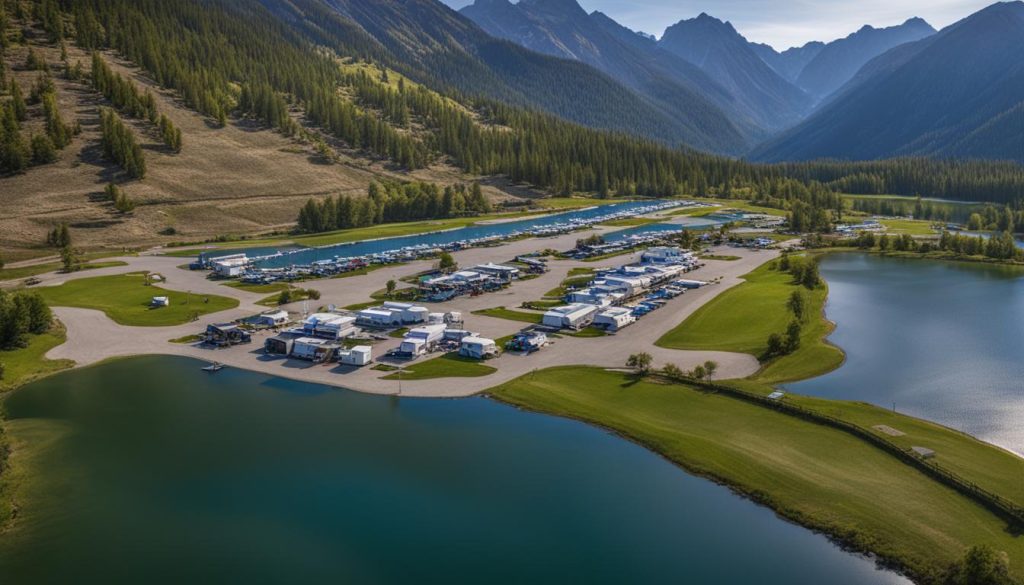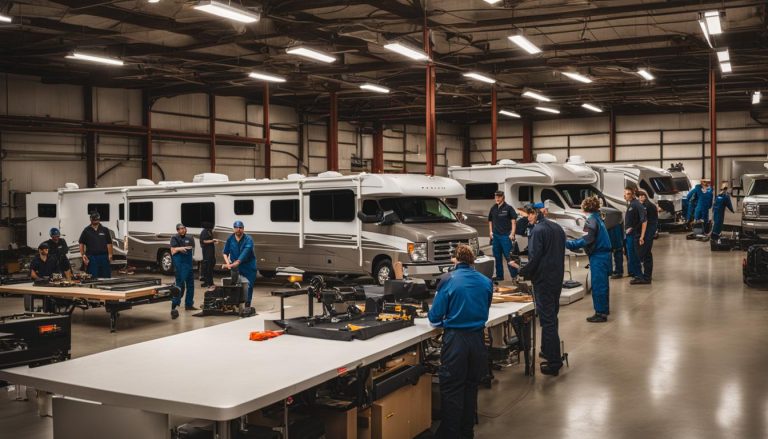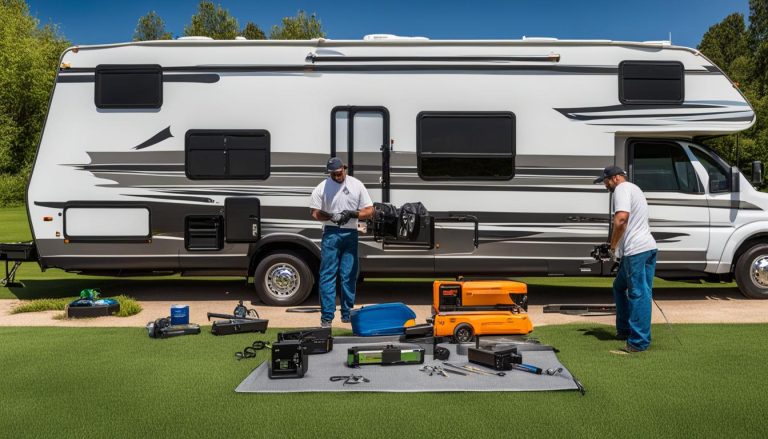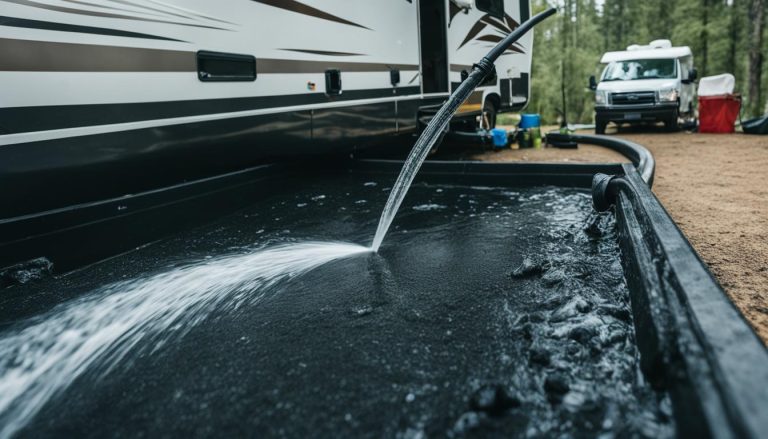Develop Your Dream RV Park Step by Step
gorvlifestyle.com and its partners may earn a commission if you purchase a product through one of our links
With the increasing popularity of RV travel and camping, owning an RV park can be a profitable venture. However, it requires careful planning and execution. In this guide, we will provide you with step-by-step instructions on how to create your dream RV park. We will cover zoning and permits, designing the layout, essential infrastructure, and attracting customers to your park. By following these steps, you can build a successful and cost-effective RV park.
Key Takeaways:
- Creating an RV park requires careful planning and execution.
- Zoning and permits are essential for RV park development.
- Designing an efficient layout is crucial for a successful RV park.
- Investing in essential infrastructure, such as water supply and waste removal facilities, is necessary.
- Attracting customers can be achieved through effective marketing strategies and partnerships with local businesses.
Pinpointing the Location and Type of Park
When it comes to creating an RV park, the first crucial step is to determine the location and type of park that aligns with your goals. You have two options: buying an existing operational campground or starting from scratch with a new one. Both have their pros and cons, so it’s important to carefully weigh your options.
In choosing the location for your RV park, several considerations come into play. Firstly, you should factor in the weather and seasonality of the area. Certain regions experience extreme weather conditions that may affect the feasibility of operating an RV park throughout the year. Additionally, understanding the number of existing campgrounds in the vicinity is vital for identifying potential competition and assessing the market saturation.
Profitability is a key aspect to evaluate when selecting a location. Research how the chosen location fares during different seasons and analyze if it aligns with your financial objectives. Keep an eye out for any local events or attractions that could potentially drive more traffic to your park during peak times.
To make an informed decision, it’s crucial to research the local market and competition thoroughly. Look into their offerings, pricing, amenities, and target audience. This information will help you identify gaps in the market and determine if there is sufficient demand to support your business.
It’s also important to consider any potential environmental impacts of the location. Are there any known risks of natural disasters like hurricanes, floods, or wildfires? Assessing these factors will help you devise appropriate risk management strategies and ensure the safety of your guests.
Remember, pinpointing the ideal location and type of your RV park is a crucial foundation for success. Take the time to conduct thorough research, evaluate market conditions, and consider all relevant factors to make an informed decision.
Creating a Solid Business Plan
To ensure the success of your RV park, it is crucial to create a comprehensive business plan. A well-thought-out business plan will serve as the foundation for your venture, providing a roadmap for success. It will outline your mission statement, target market, competitive advantages, marketing and sales strategies, financial projections, and funding requirements.
An effective business plan for an RV park should include the following key components:
- Mission Statement: Clearly define the purpose and values of your RV park.
- Target Market Analysis: Identify your ideal customers and understand their needs and preferences.
- Competitive Advantages: Determine what sets your RV park apart from competitors and highlight those unique features.
- Marketing and Sales Strategies: Outline your plans to attract and retain customers, including online advertising, social media promotion, and partnerships with local businesses.
- Financial Projections: Create detailed financial forecasts for the first five years, including income statements, balance sheets, cash flow statements, and capital expenditure budgets.
- Funding Requirements: If you require funding, clearly outline how much capital you need and how you plan to use it. Present a persuasive case for why your RV park is a sound investment.
Securing a loan for an RV park can be a complex process. Lenders will evaluate your business plan to assess the viability of your venture and the potential return on investment. Providing accurate financial projections, compelling funding asks, and a well-reasoned business strategy will increase your chances of obtaining the necessary financing.
Financial Projections and Funding Asks
Financial projections are essential to demonstrate the potential profitability of your RV park. Use historical industry data, market research, and realistic assumptions to create your forecasts. Include revenue projections, expense breakdowns, and expected returns on investment.
In addition to financial projections, clearly outline your funding asks in your business plan. Specify the amount of capital you need and explain how the funds will be used to start or improve your RV park. Show potential lenders or investors that your venture is a worthwhile opportunity.
Remember, a solid business plan is not only valuable for securing funding but also serves as a roadmap for your own decision-making and business operations. Regularly review and update your plan to stay on track and adapt to market changes.

By creating a solid business plan for your RV park, you will lay the groundwork for success. It will help you make informed decisions, attract investors or lenders, and guide you in achieving your long-term goals. Take the time to carefully develop your business plan, ensuring that it addresses all the key components and financial projections necessary to secure the funding and support your venture needs.
Obtaining Permits and Building Infrastructure
Before you can start construction on your RV park, you need to obtain the necessary permits and licenses. This is an important step to ensure that you comply with the legal requirements and regulations in your area. The specific permits and licenses you will need may vary depending on your location, so it is essential to research the requirements specific to your region.
In most cases, you will need to work with the city planning board or local authorities to obtain the necessary permits. They can provide guidance on the land use requirements and zoning regulations that you need to comply with. By following these regulations, you can ensure that your RV park meets the necessary standards for safety and functionality.
In addition to permits, you also need to focus on building the infrastructure for your RV park. This includes providing essential facilities such as water supply and waste removal systems. It is crucial to have a reliable and efficient system in place to meet the needs of the RV park residents.
Building relationships with the local community is also essential for the success of your RV park. By fostering connections and partnering with local establishments, you can attract more customers and generate referrals. Engaging with the community can also help you navigate the permit process more smoothly. Establishing positive relationships with neighboring businesses and residents can create a supportive network that contributes to the overall success of your RV park.
Permits and Licenses for an RV Park
When it comes to permits and licenses for an RV park, there are several key requirements to consider:
| Permits and Licenses | Description |
|---|---|
| Zoning Permit | This permit ensures that your RV park complies with local zoning regulations and land use requirements. It establishes the type and scale of development allowed on the property. |
| Building Permit | A building permit is required for constructing any structures on the RV park premises. This permit ensures that the buildings meet safety and construction standards. |
| Health and Safety Permit | This permit ensures that your RV park meets health and safety standards, including provisions for waste removal, water supply, and sanitation facilities. |
| Operating License | An operating license is necessary for legally operating your RV park. It verifies that your park meets all the necessary requirements and is compliant with local regulations. |
By obtaining the required permits and licenses and building the necessary infrastructure, you can lay the foundation for a successful and compliant RV park.

Marketing and Managing Your RV Park
Once your RV park is up and running, it is crucial to implement effective marketing strategies to attract customers. Online advertising, social media promotion, and partnerships with local businesses are some of the key tactics to consider. By reaching out to your target audience through digital channels, you can increase brand awareness and drive more traffic to your RV park.
An important element of your marketing strategy is having a well-designed and informative website. A website serves as a virtual storefront, allowing potential customers to learn about your park’s amenities, browse photos, and make reservations. It is an essential platform to showcase what sets your RV park apart and entice visitors to choose your location for their next outdoor adventure.
Investing in management software can significantly enhance your operations. With the right software, you can streamline tasks such as reservation management, guest communication, and financial tracking. This efficiency not only saves you time but also improves customer satisfaction. By leveraging technology, you can provide a seamless experience for your guests and focus on delivering exceptional service.
When it comes to building a successful RV park, hiring experienced staff with a background in campground management is crucial. These individuals can ensure the smooth day-to-day operations of your park, handle customer inquiries, and maintain the overall cleanliness and functionality of the site. A knowledgeable and friendly staff can significantly enhance the guest experience, leading to positive reviews and repeat business.
Creating partnerships with local businesses can bring added value to your RV park. By collaborating with nearby attractions, restaurants, or outdoor activity providers, you can offer exclusive discounts or packages to your guests. This not only enhances the experience of your visitors but also supports the local community. Building strong relationships with local businesses can also generate referrals and create additional revenue streams for your park.
FAQ
How do I choose the location for my RV park?
When choosing a location for your RV park, consider factors such as weather, seasonality, existing competition, local market conditions, and potential environmental impacts. Researching the local market and assessing the profitability of the location throughout the year will help you make an informed decision.
What should I include in my business plan for an RV park?
A comprehensive business plan for an RV park should include your mission statement, target market, competitive advantages, marketing and sales strategies, financial projections, and funding requirements. It is important to provide detailed financial projections and make a persuasive case for why your RV park is a sound investment if you require funding.
What permits and licenses do I need to open an RV park?
To open an RV park, you will need to obtain permits and licenses. This may involve working with the city planning board and complying with local and state zoning regulations. You will also need to ensure that your park meets the land use requirements and has essential infrastructure such as water supply and waste removal facilities. Research the specific regulations and requirements in your region.
How can I attract customers to my RV park?
To attract customers to your RV park, implement effective marketing strategies such as online advertising, social media promotion, and partnerships with local businesses. A well-designed website showcasing your park’s amenities is crucial. Investing in management software will streamline operations, and hiring staff experienced in campground management will enhance customer experience. Building partnerships with local businesses can also create additional revenue streams.






